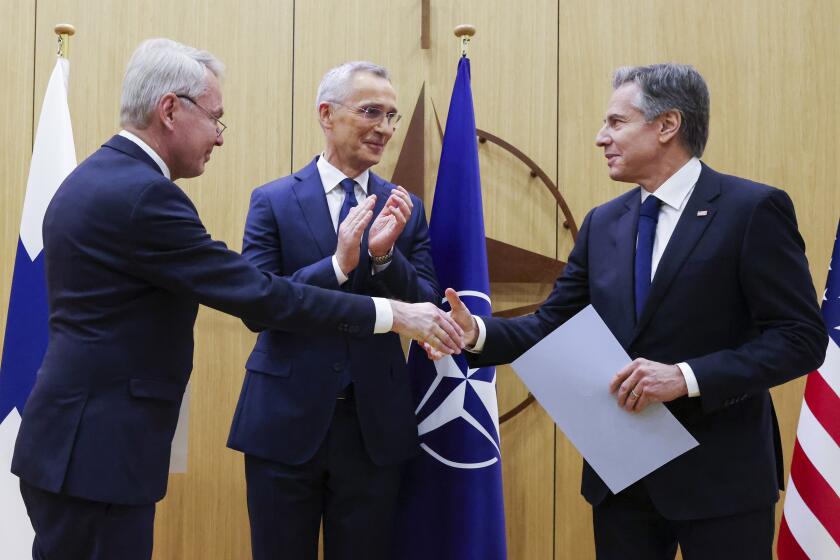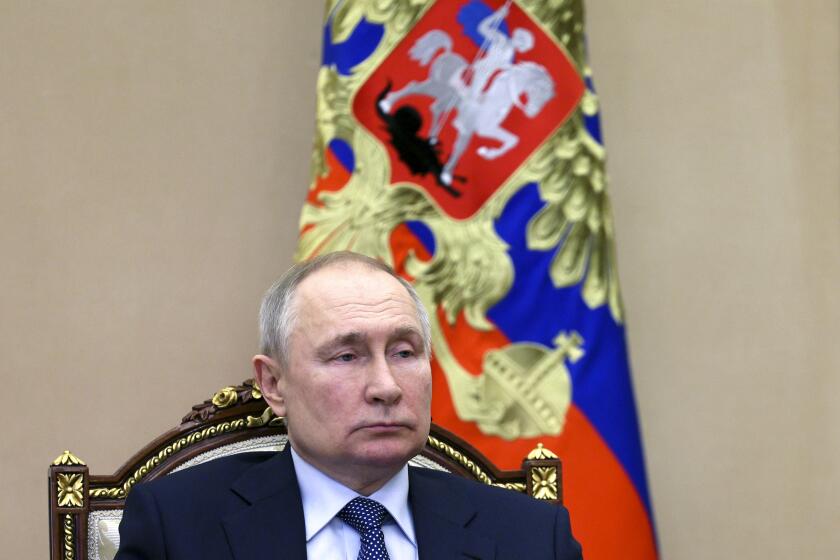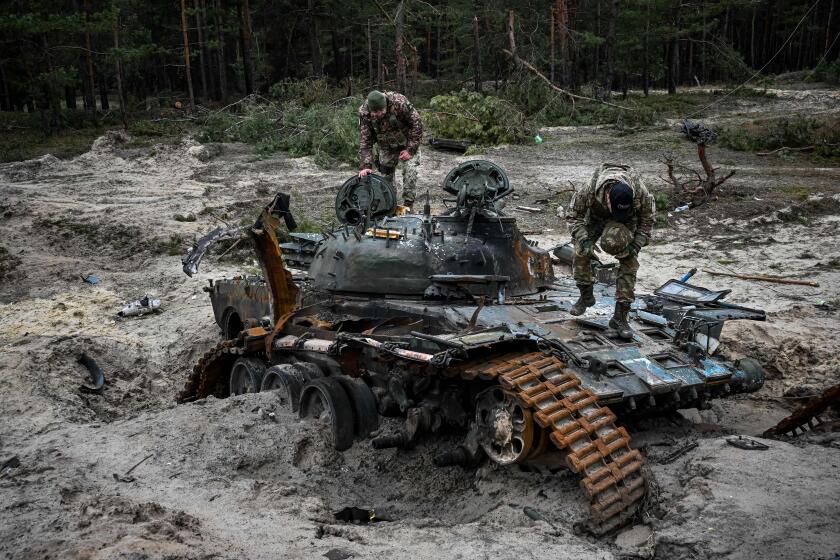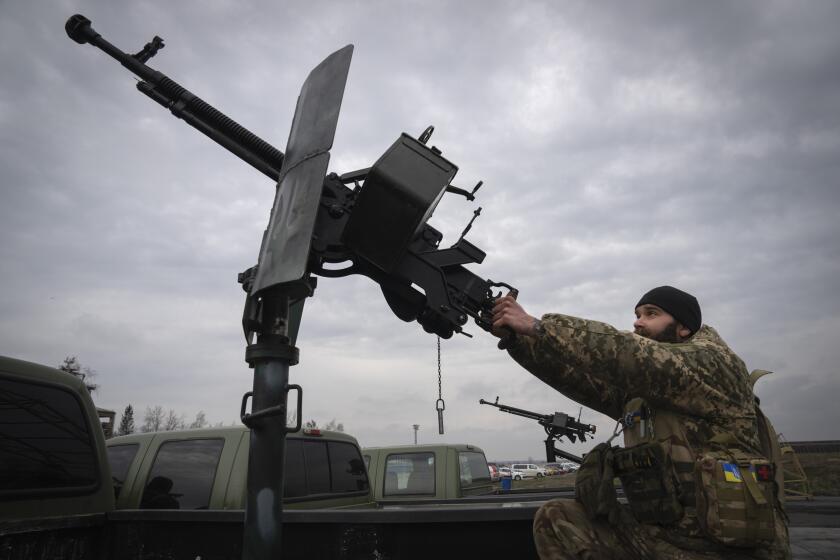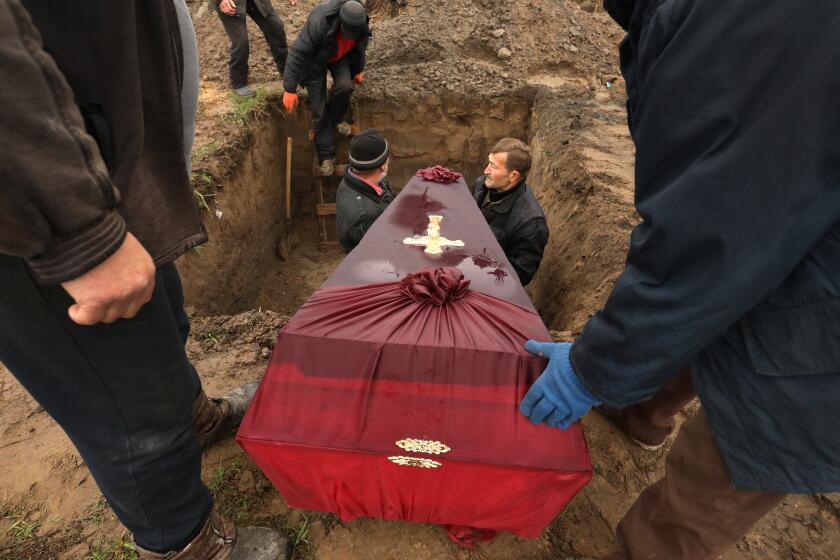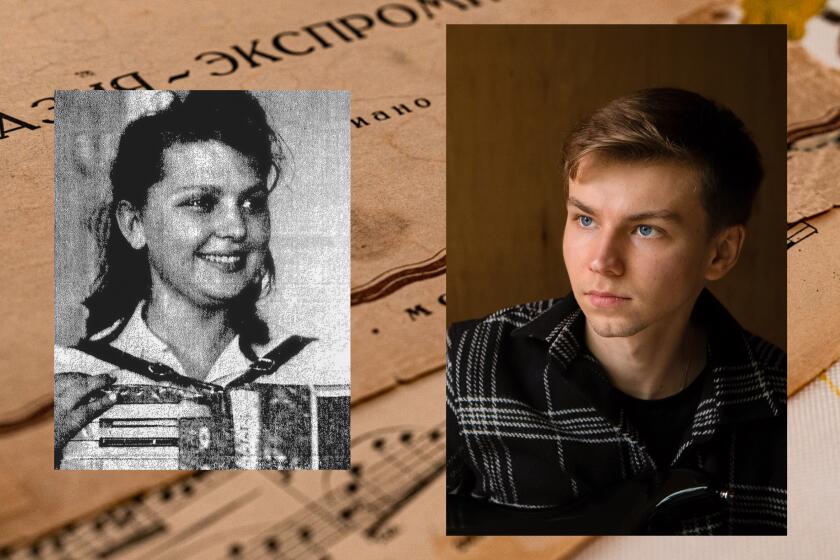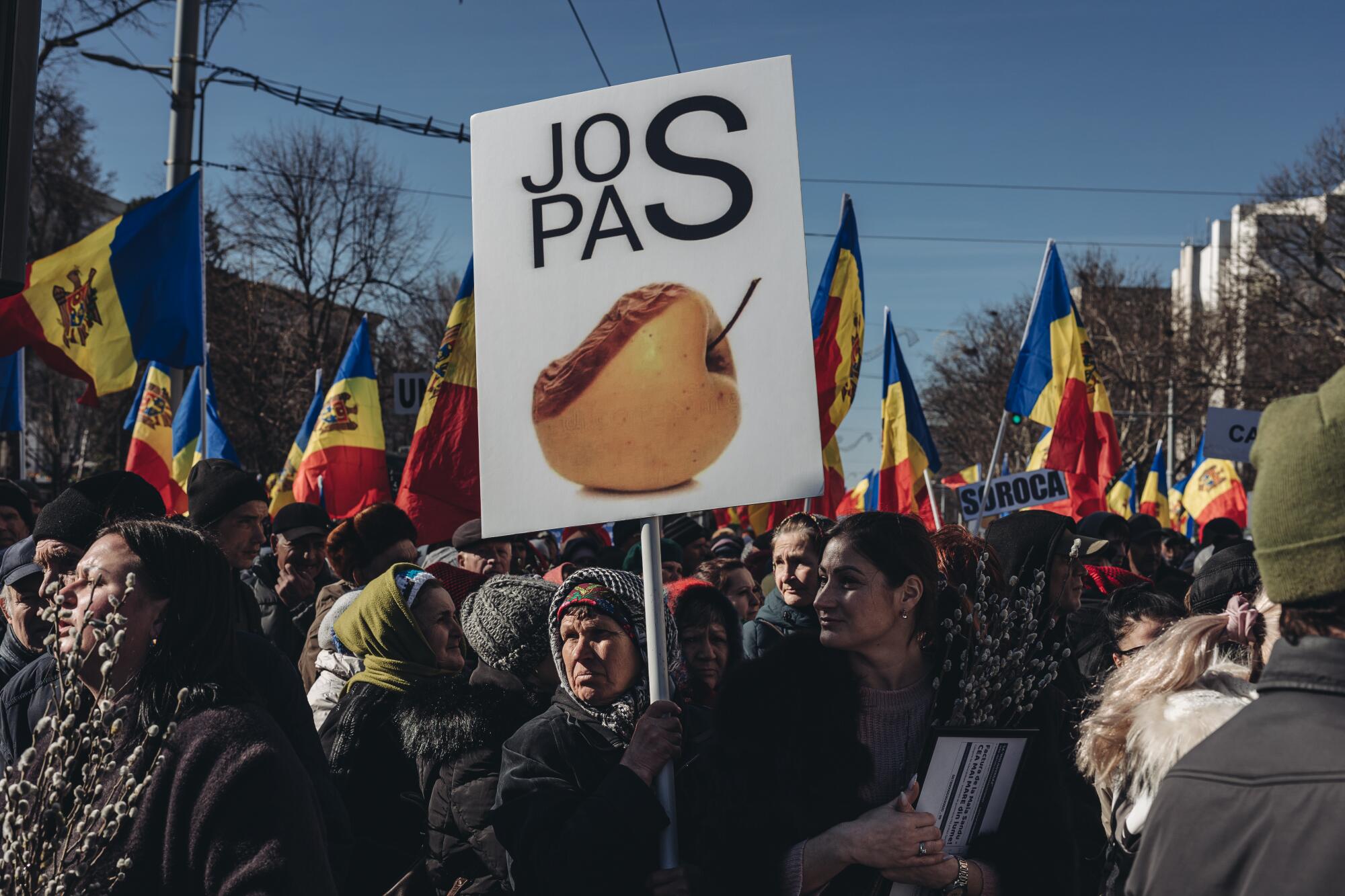
CHISINAU, Moldova — At its heart, the plan was simple: Dispatch military-trained saboteurs, embed them among protesters and have them attack government buildings, perhaps even take hostages. That would light the spark for a full-on insurrection that, with the help of Kremlin-aligned opposition figures, would topple Moldova’s Western-leaning president, Maia Sandu, and install a Russia-friendly ruler in her stead.
But Moldovan authorities got wind of the alleged plot and exposed it. In a grim speech in February, Sandu said the plan was launched at Moscow’s behest to bring about a coup d’etat in this tiny republic caught between its Soviet past and the future it seeks with the West.
As the world maintains its focus on Russia’s year-old invasion of Ukraine, a similarly existential, if less bloody, fight is being waged here as Moldova struggles to keep from being turned once more into a puppet of Moscow. Like Ukraine, Moldova is trying to ward off a bigger, better-equipped foe — but without benefit of the same massive level of Western aid that has been poured into its war-torn eastern neighbor.
So far, Moldovan officials say, the Russian-backed forces in their country haven’t been soldiers but rather the thousands of protesters who have flooded Stefan cel Mare Boulevard — the main thoroughfare in Chisinau, the capital — at least once a month since September.
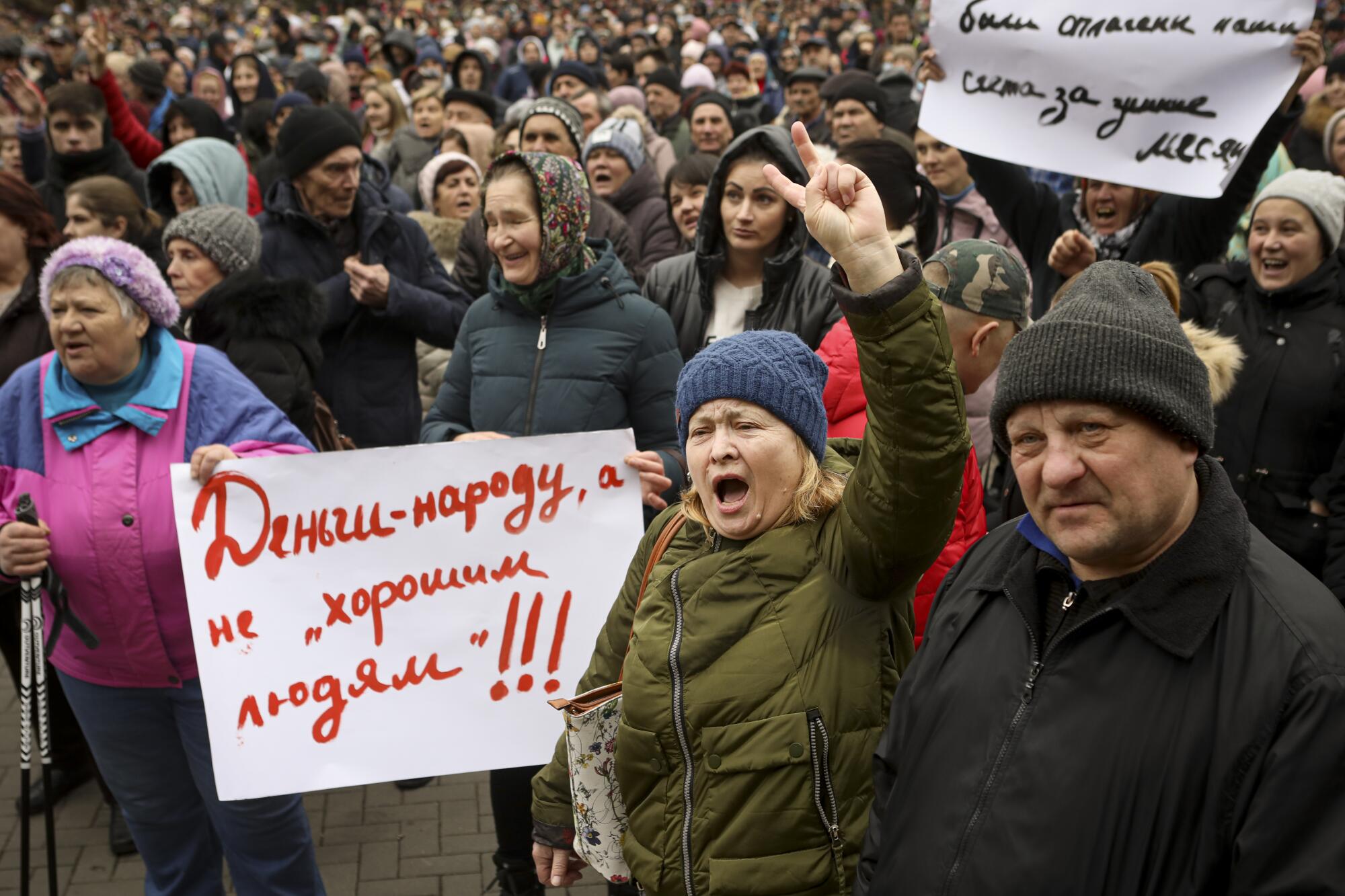
The protesters complain of crippling inflation, which has made most goods more expensive by a third, along with a sevenfold surge in the price of natural gas. But they have also raised placards saying, “We want peace,” and other slogans excoriating what they call Sandu’s ill-conceived determination to join the European Union and side against Russia in its war on Ukraine.
The government sees the demonstrations as the handiwork of Moscow, acting in concert with the country’s main pro-Russia opposition party, which organized — and allegedly bused in and paid — people from all over the country to take part.
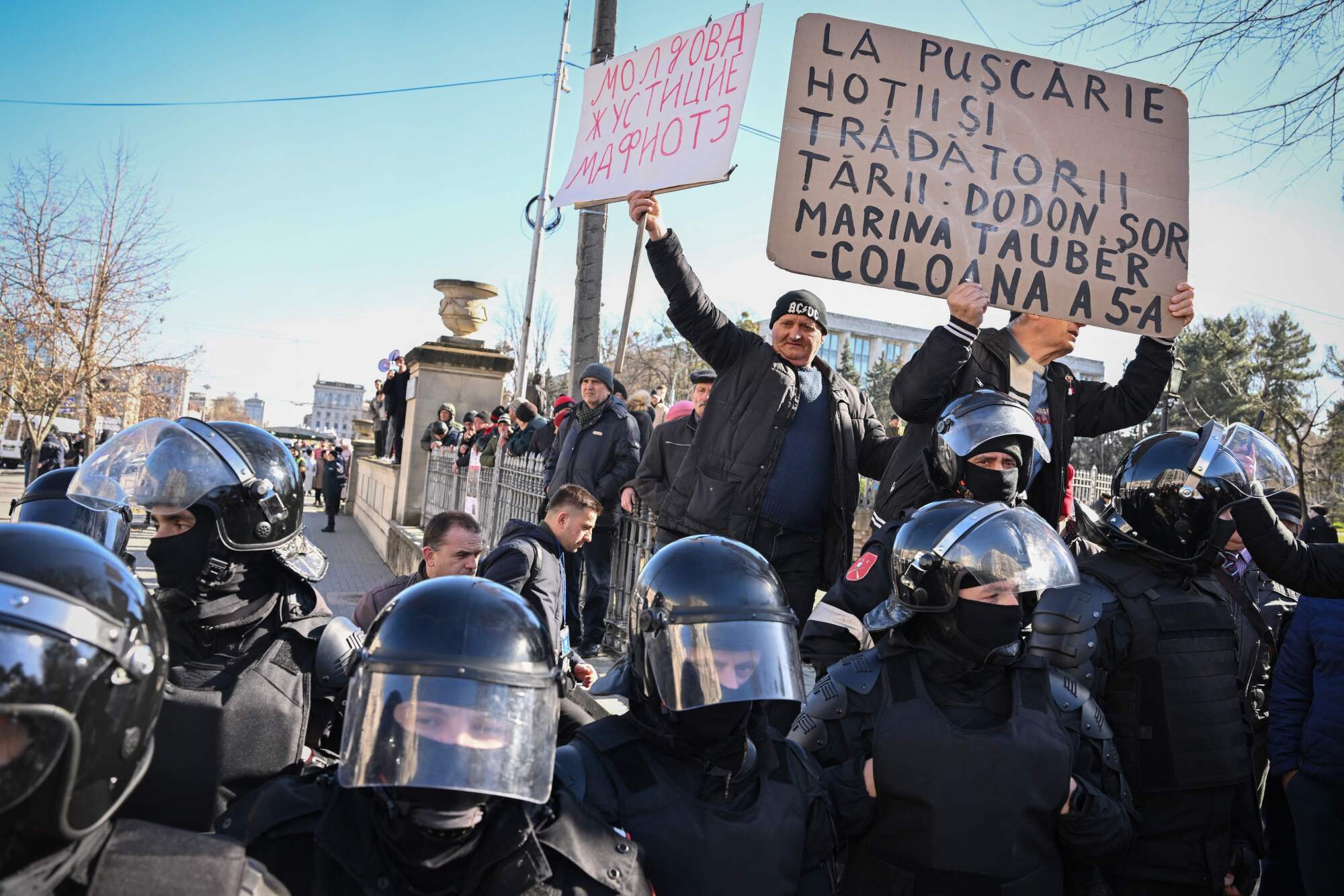
After demonstrations in mid-March, authorities said they foiled “diversionists” who were disbursing funds to cause “mass disorder” during the protests, and police claimed to have uncovered a number of bomb threats in various parts of Chisinau, including at its airport.
Those machinations are part of a multipronged plan by the Kremlin, Sandu said, to overthrow her and “put our country at the disposal of Russia, in order to stop the European integration process, but also so that Moldova can be used by Russia in its war against Ukraine.” The plan involves fomenting popular unrest, spreading disinformation and engaging in economic warfare, according to Moldovan officials.
“It goes hand in hand with what Russia is doing in Ukraine,” Deputy Prime Minister Dumitru Alaiba said in an interview with The Times. “Because while they are bombing Ukraine, they’re trying to destabilize Moldova.”
It’s a view echoed by European and U.S. officials. At a joint news conference March 28, European Council President Charles Michel told Sandu that in recent months “Russia and its proxies have increasingly tried to destabilize your country using energy, cyberattacks, staging protests and other disruptive activities.”
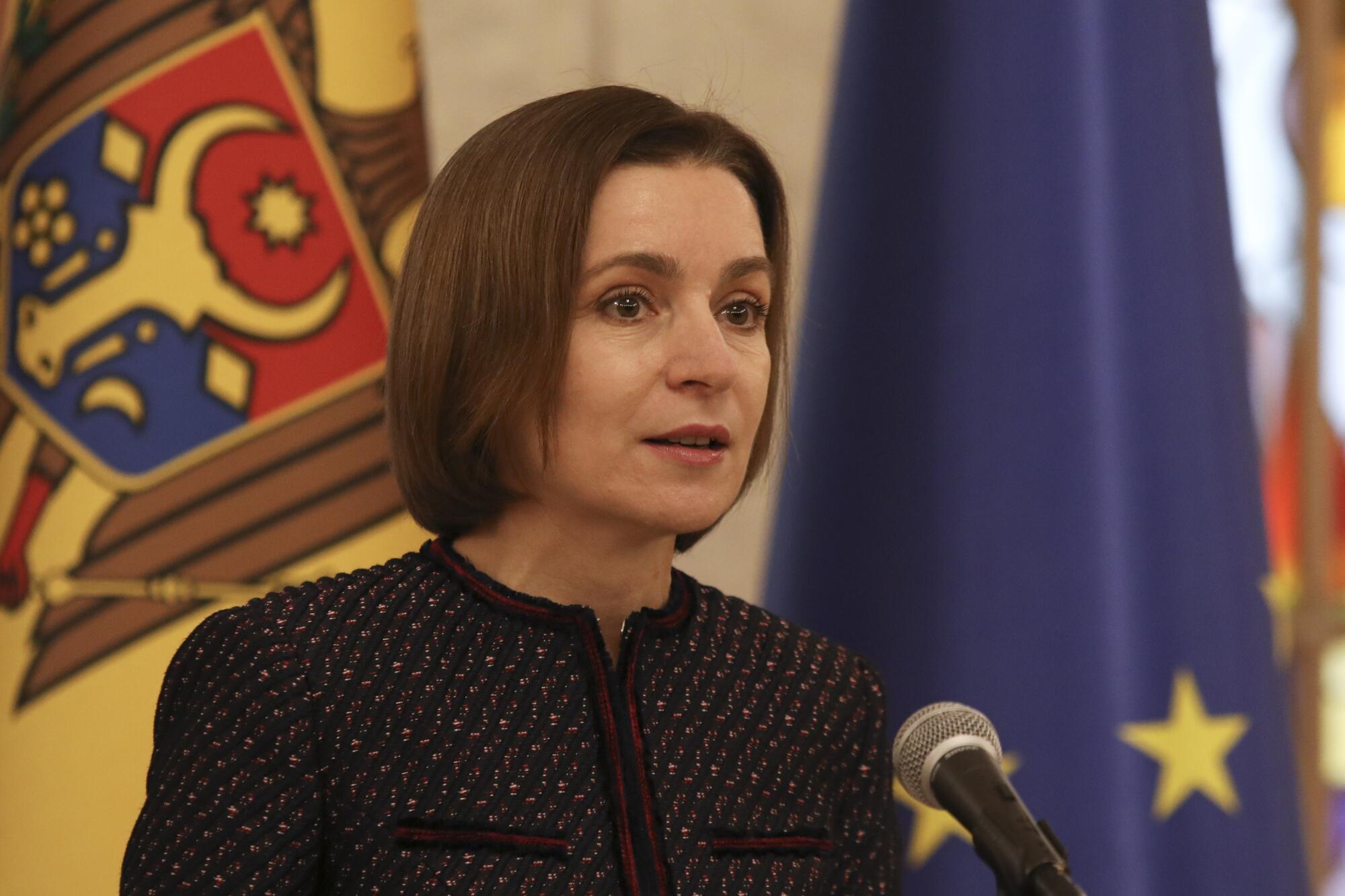
The government of then-Moldovan Prime Minister Natalia Gavrilita collapsed in February in the face of what she said were multiple crises brought on by Russia. Sandu has appointed another pro-Western premier, Dorin Recean, to replace her.
Russia denies the allegations of covert subversion, and instead accuses Western powers of trying to turn Moldova into a “new Ukraine,” as Russian Foreign Minister Sergei Lavrov put it in an interview with the Rossiya-24 TV channel in February.
“Now they are sizing up Moldova for this role, primarily because they were able to place a president at the helm of the country who is itching to join NATO,” he said, adding, without evidence, that Sandu was planning to unite her country with its western neighbor, Romania. “This is one of the countries that the West wants to turn into another anti-Russia.”
Finland is now NATO alliance’s 31st nation, a major blow to Russia with a historic realignment of Europe spurred by Moscow’s invasion of Ukraine.
Moldova isn’t the only European target of the Kremlin’s destabilization efforts, of course. Since the war in Ukraine began, Russia has followed a similar strategy across the continent, using its gas riches — and pain at the pump — to play havoc with European economies. But Moldova, a nation slightly larger than Maryland, with a population of 2.6 million, seems particularly at risk.
One of Europe’s poorest countries, Moldova has been hit hard economically by the war. Sandwiched between Ukraine and Romania, it has been unable to send its mostly agricultural products to the nearby southern Ukrainian port of Odesa for export. Its longtime reliance on Moscow for cheap gas — before the war, it imported 100% of its supply from Russia’s state-owned Gazprom — makes it vulnerable to manipulation; when Gazprom cut supplies in October, prices shot up.
Moldova is also close enough to the conflict that when Russia attacked energy infrastructure in Ukraine, the lights went out here. In February, a pair of Russian cruise missiles traversed Moldova’s skies before slamming into their targets across the eastern border.
The result, Alaiba said, “is that we are the biggest collateral victim of the war in Ukraine.”
Russia’s ambassador to Belarus says that Moscow will deploy tactical nuclear weapons close to Belarus’ border with NATO countries
Although the country aspires to join the European Union and the North Atlantic Treaty Organization, membership in either — and the protection and support that would flow from it — is years away. Washington has made nearly $320 million in economic, security and humanitarian assistance available to Moldova to help it manage the impact of the war, but that is dwarfed by the aid that the U.S. and EU have funneled to Ukraine.
Moldova is well-acquainted with interference and intimidation from Moscow. In a hangover from the dissolution of the Soviet Union, Kremlin-backed separatists have controlled a pencil-thin area of Moldovan territory known as Transnistria, along the border with Ukraine, since 1992, after they defeated Moldovan forces in a bloody conflict.
Although not even Moscow has recognized it as a separate state, Transnistria and its majority ethnic Russian and Ukrainian population play host to 1,500 Russian peacekeeping troops and a Soviet-era ammunition depot with an astounding 22,000 tons of bullets, bombs and shells — the largest in Eastern Europe — a mere two miles from the Ukrainian border.
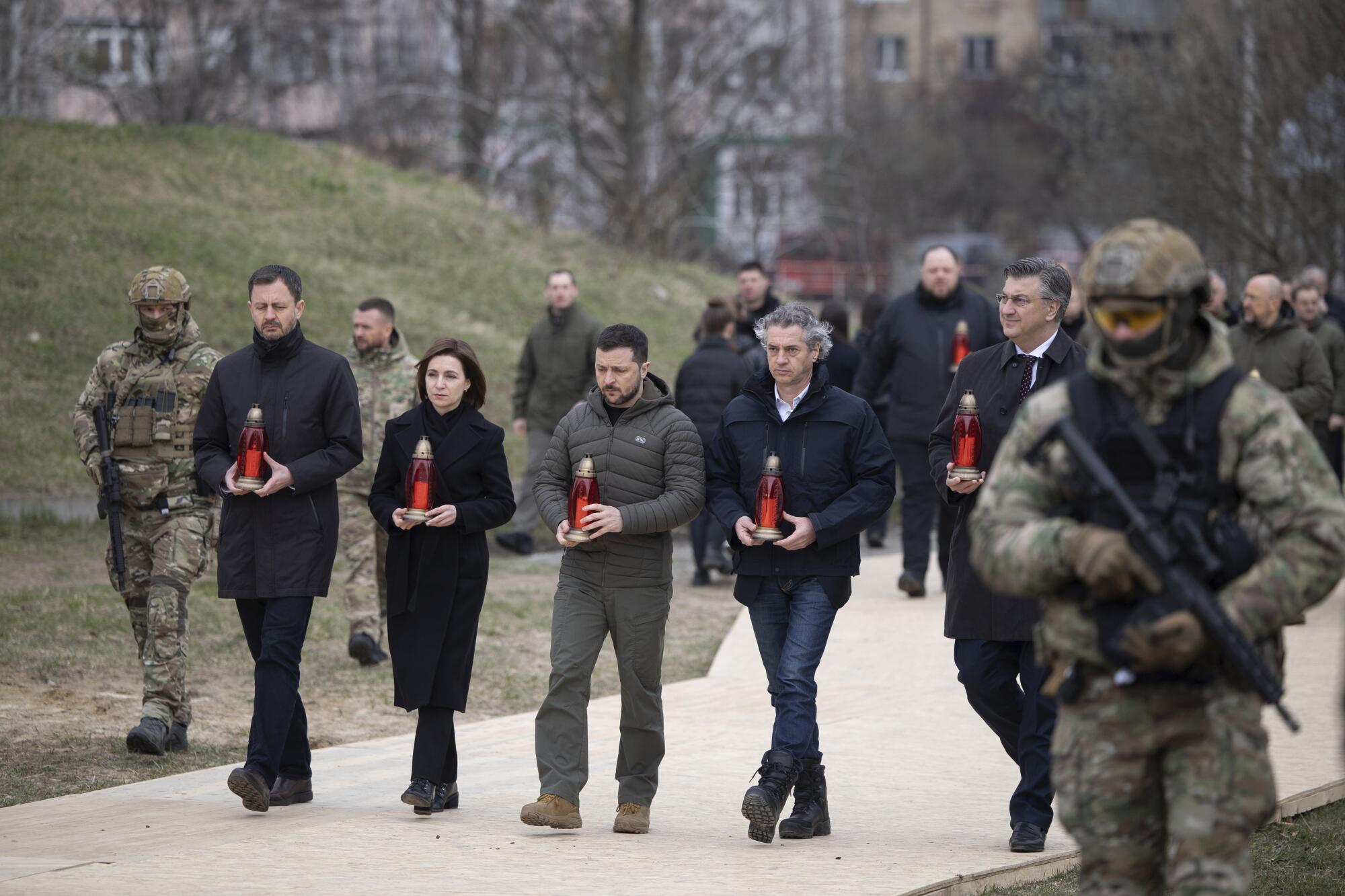
When the war in Ukraine began, the fear was that Russian forces would capture Odesa, recognize Transnistria as a Moscow-friendly breakaway state and then thrust up into the territory to “defend” it.
That failed to materialize because of Russian retreats from the Kyiv region and the southern city of Kherson.
But Russia continues to fan tensions in the region, and even claimed in February that Kyiv was preparing “an armed provocation” inside Transnistria so as to invade the breakaway region. The territory’s pro-Moscow authorities said last month they had foiled a Ukrainian plot aimed at assassinating the region’s leader. Kyiv dismissed both claims.
The Ukrainian military’s surrender hotline, dubbed ‘I Want to Live,’ is enticing some Russian soldiers to quit the battlefield as the war drags on.
Lavrov, the Russian foreign minister, warned late last month that Russia would respond to any provocation in Transnistria, saying Moscow would enforce security in the territory “in full accordance with the mandate that our servicemen have.”
“We will be guided by this mandate,” he said.
Despite being viewed as little more than Russian proxies, many in Transnistria say they have no interest in provoking a fight with any of their neighbors. Transnistria and Moldova so far have maintained a cordial, even cooperative existence, with people going back and forth across the border with ease because most Transnistrians have Moldovan passports.
“Having gone through the war with Moldova 30 years ago, having gone through the death of people and the destruction of cities, we in Transnistria value peace very much,” said Sergei Shirokov, a Transnistria-based political analyst and former official. “It would be correct to say that in Transnistria — and I hope in Moldova — not only would they not want to be in the epicenter of the conflict in Ukraine, but also insist on the conflict not spreading to our region.”
News Alerts
Get breaking news, investigations, analysis and more signature journalism from the Los Angeles Times in your inbox.
You may occasionally receive promotional content from the Los Angeles Times.
A more potent tactic for Russia in Moldova has been its propaganda campaign, conducted with the support of Moscow-friendly local political groups, especially the Shor Party, which holds six seats in the country’s 101-seat legislature and which has been the driving force behind most of the recent protests here in Chisinau.
Although these groups were quiet in the first part of the Ukraine war, they soon mobilized against Sandu for what they described as her violation of Moldova’s neutrality when she condemned Russia’s actions at the start of the invasion, said Valeriu Pasa, chairman of WatchDog Moldova, a think tank that monitors disinformation in the country. They rallied people from all over the country to join the anti-government protests, paying participants at least $30 and covering their transportation costs, Pasa said.
After one Shor-led demonstration last month, Moldova’s national anti-corruption agency said it seized hundreds of thousands of euros from the party’s couriers that were to be disbursed as payment to demonstrators.
The party was founded by Ilan Shor, a 35-year-old Moldovan oligarch who fled the country after his conviction in 2017 for embezzling some $1 billion from Moldovan banks. He now lives in exile in Israel and was placed under U.S. sanctions last year for acting as an “instrument of Russia’s global influence campaign.”
A top Ukrainian official has outlined a series of steps the government in Kyiv would take after the country reclaims control of Crimea from Russia.
Before his sanctioning, Shor released dozens of ads on Facebook in which he called on his followers to mobilize against the country’s leaders, “pull them out of their offices by the ears and throw them out of our country like evil spirits.”
The propaganda has had an impact, Pasa said, citing opinion polls that say half of Moldovans believe that Russia is fighting NATO in Ukraine and that Russians and Ukrainians are the same people — regular Kremlin talking points. Most don’t believe Russia would attack Moldova.
Yet at the same time, most do not support Moscow’s war in Ukraine, and don’t believe Kyiv should cede territory to end it. Sandu has held steadfast in her support for Ukraine, visiting the beleaguered city of Bucha — site of a massacre last year by Russian forces — with Ukrainian President Volodymyr Zelensky on March 31.
“The fact that people trust some of the Russian narratives doesn’t mean that they’re pro-Russian. This is about the efficiency of their strategic messages,” Pasa said.
Russian atrocities number in the tens of thousands, Ukraine says. The ICC wants to arrest Putin. But what are the prospects for justice?
Late last year, the Moldovan government blocked six domestic TV channels for spreading misinformation about the war in Ukraine.
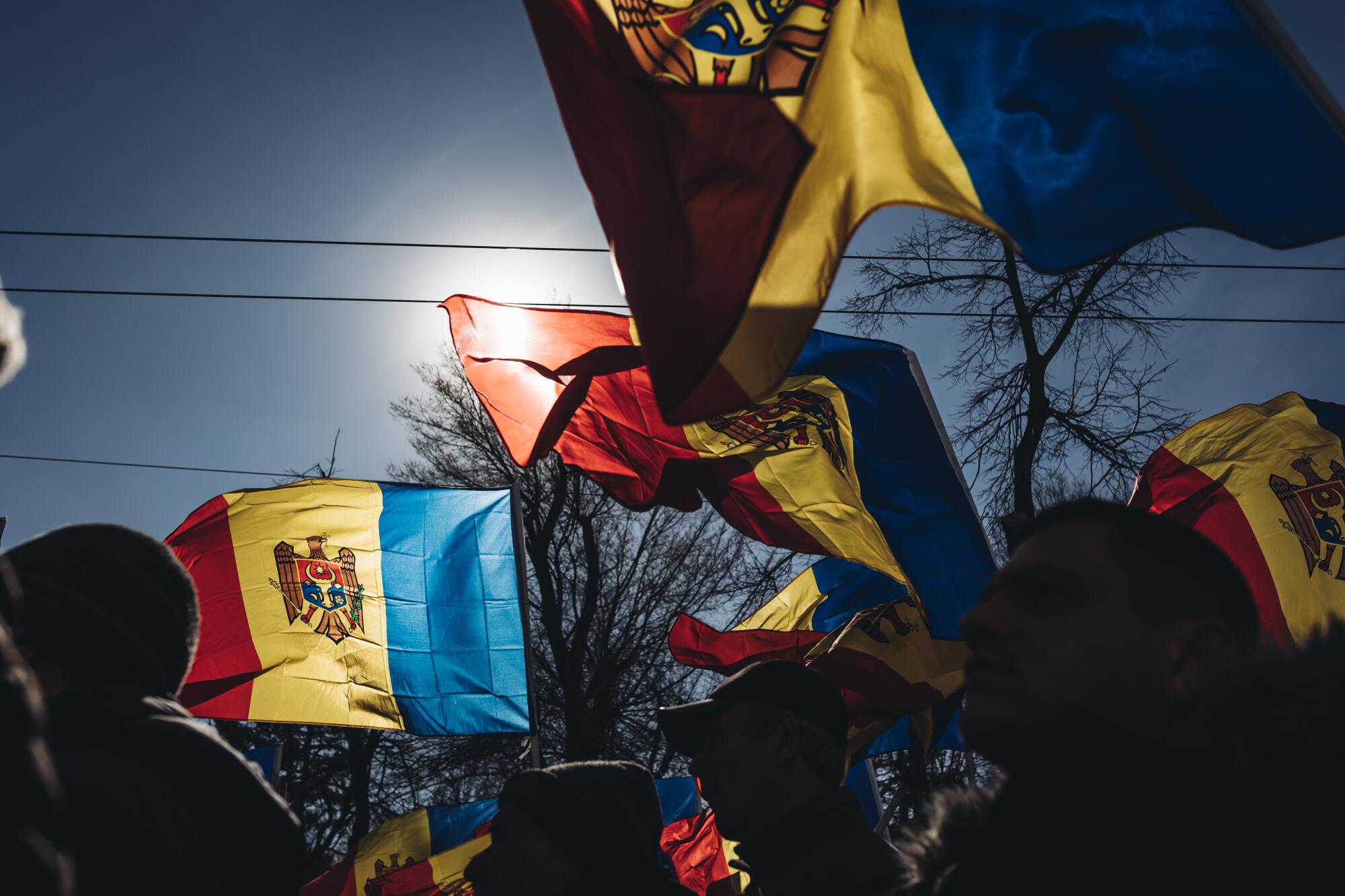
The biggest driver of anti-government dissent, said Alexandru Flenchea, a Chisinau-based analyst and former deputy prime minister, is the dire state of the economy.
Moldova has sought to wean itself off Russian gas and strengthen links with Europe. After Moscow reduced gas supplies last year, Chisinau decided to send all Russian gas imports to Transnistria, which used those supplies to generate electricity and sell the excess power to Chisinau at favorable prices.
Alaiba, the deputy prime minister, said that last year was the first time in Moldova’s history that it purchased gas from suppliers other than Russia, and there are plans to accelerate an interconnector project with Romania.
During the Holocaust, a Ukrainian family hid a girl from the Nazis. Decades later, with Ukraine at war, her son and a community of strangers repay the kindness.
But the government will have to do more if it’s to survive against deep-pocketed, pro-Russia opponents like Shor, Flenchea said.
“The best thing Moldovan authorities could do is really good visible progress on economic and social reform,” Flenchea said. “Shor, his party, have their own political agenda, but it’s not shared by the people who go out to the streets.
“The only reason Shor can get many people in the streets is that they’re desperate. It’s just despair.”
More to Read
Sign up for Essential California
The most important California stories and recommendations in your inbox every morning.
You may occasionally receive promotional content from the Los Angeles Times.
